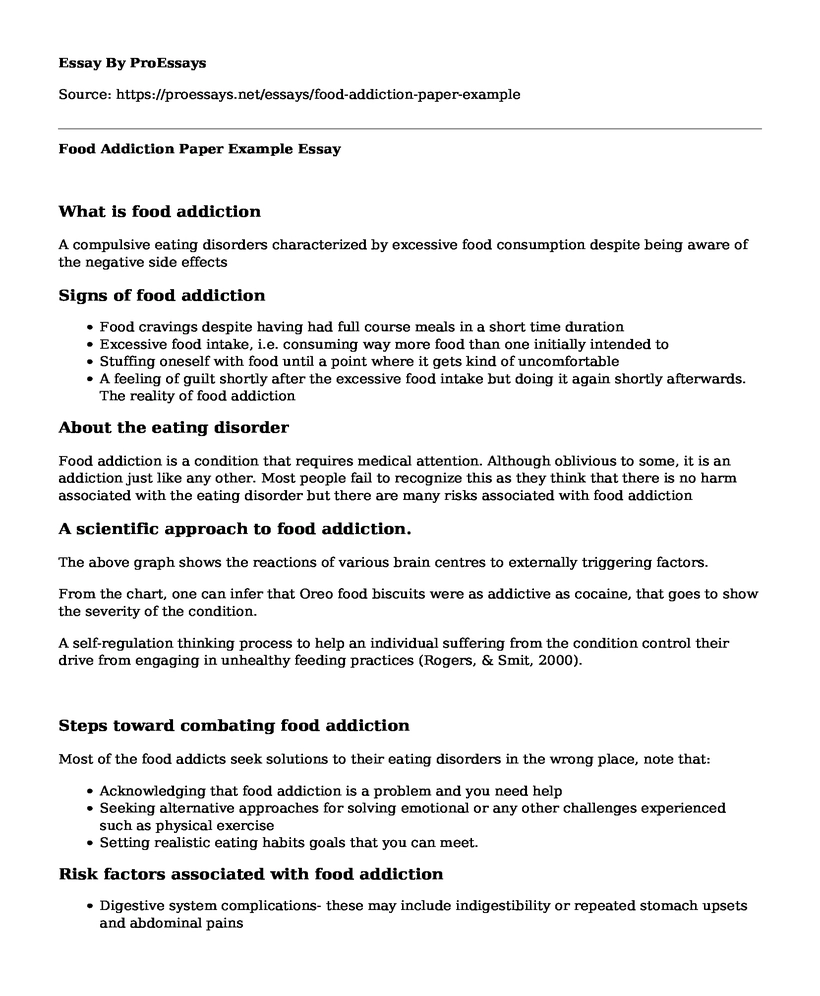What is food addiction
A compulsive eating disorders characterized by excessive food consumption despite being aware of the negative side effects
Signs of food addiction
- Food cravings despite having had full course meals in a short time duration
- Excessive food intake, i.e. consuming way more food than one initially intended to
- Stuffing oneself with food until a point where it gets kind of uncomfortable
- A feeling of guilt shortly after the excessive food intake but doing it again shortly afterwards. The reality of food addiction
About the eating disorder
Food addiction is a condition that requires medical attention. Although oblivious to some, it is an addiction just like any other. Most people fail to recognize this as they think that there is no harm associated with the eating disorder but there are many risks associated with food addiction
A scientific approach to food addiction.
The above graph shows the reactions of various brain centres to externally triggering factors.
From the chart, one can infer that Oreo food biscuits were as addictive as cocaine, that goes to show the severity of the condition.
A self-regulation thinking process to help an individual suffering from the condition control their drive from engaging in unhealthy feeding practices (Rogers, & Smit, 2000).
Steps toward combating food addiction
Most of the food addicts seek solutions to their eating disorders in the wrong place, note that:
- Acknowledging that food addiction is a problem and you need help
- Seeking alternative approaches for solving emotional or any other challenges experienced such as physical exercise
- Setting realistic eating habits goals that you can meet.
Risk factors associated with food addiction
- Digestive system complications- these may include indigestibility or repeated stomach upsets and abdominal pains
- Heart diseases- e.g. coronary thrombosis and higher chances of heart attacks
- Obesity- excessive weight gain leading to a massive deviation in the BMI ratio index
- Self-esteem related issues as a result of being overweight or obese
Food addiction: a big problem with a simple solution
Get the exact results you want
This is a self-directed activity that must come from within the individual and cannot be forced.
Upon acceptance of the presence of a problem, the next step is working towards the results/outcome that you want
Adapting healthy eating habits
Healthy eating habits are perceived to be strict dietary regimes that are difficult to observe or follow. However, this is not the case, if anything dietary regimes are essential in enabling an individual to observe a healthy feeding program. (Gearhardt, et al. 2011)
Steps toward healthy eating
- Replacement of junk foods with easily digestible foods that have a lower calorific content
- Taking part in physical activities to burn calories and help in the digestion and absorption process of the food taken
- Psychiatric and self-help groups with people with a similar condition have also proven to be helpful
- Reducing junk food intake and gradually introducing organic foods in the dietary regimes
References
Gearhardt, A. N., Yokum, S., Orr, P. T., Stice, E., Corbin, W. R., & Brownell, K. D. (2011). Neural correlates of food addiction. Archives of general psychiatry, 68(8), 808-816.
Rogers, P. J., & Smit, H. J. (2000). Food craving and food "addiction": a critical review of the evidence from a biopsychosocial perspective. Pharmacology Biochemistry and Behavior, 66(1), 3-14.
Cite this page
Food Addiction Paper Example. (2022, Sep 11). Retrieved from https://proessays.net/essays/food-addiction-paper-example
If you are the original author of this essay and no longer wish to have it published on the ProEssays website, please click below to request its removal:
- Essay Example on White-Collar Crime and Deviance
- The Victimization of Children and Youth Article Review
- Equality Between the Genders Paper Example
- Racial Classification Paper Example
- Land, Housing, Homelessness: Differential Access to Homeownership
- Essay on Perceptual Awareness & Attention: Examining the Relationship
- 9/11: US Policy Shifts After Terror Attack - Essay Sample







